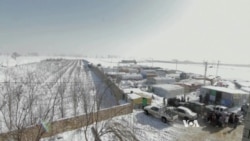A strong winter storm struck the Middle East in the middle of January. The storm has been called one of the strongest to hit the area in 10 years. Hundreds of thousands of refugees were affected by the cold and snow.
Many of the refugees live in temporary shelters, largely unprotected from the cold. Some tent settlements are found in the Lebanese capital, Beirut. Others are in the mountains of northern Lebanon.
It is a daily fight for survival.
More than a million people have fled to Lebanon, driven out of Syria by the conflict there.
But in Lebanon they face another threat.
In the Beka’a area, the refugees deal with freezing temperatures. There were reports earlier this month that at least three refugees died during heavy snowfall and storms.
Fatmi Zakour’s husband was killed in the Syrian war. She now lives in a refugee camp with 120 Syrians. She is worried about her three children.
She told VOA: “We were in a house, were so happy there. Everything changed for us here. My husband was killed, and I have two handicapped kids. And my oldest daughter has heart problems. Everything changed. We're living in a tent now. We aren't used to living in a tent. Everything is different.”
But help came for Fatmi Zakour and her family after the storms. The Lebanese government and non-governmental organizations sent doctors to the camps in an effort to help the families living in the basic, simple tents.
But there are at least 400,000 refugees in the Beka’a area, and hundreds of thousands in other parts of Lebanon. Reports estimate 83 percent of them are women and children. It will be difficult to help them all.
Dr. Fatima al-Moussawi works for Lebanon’s Ministry of Health.
"Before the storms, many refugees were able to deal with the weather. But they were not expecting the extreme cold and made no plans for how they would stay warm. There are many young children and old people among the refugees. Aid workers had to go into each tent and provide medical care there because the people inside were often unable to leave their tent. The refugee settlements do not have good roads, fresh water or electricity."
Experts say Lebanon is now home to 1.6 million refugees. Many live in the more than 1,400 temporary camps across the country.
For many of the refugees, this is not their first winter living in such conditions. But it is one of the coldest.
Some of them are in poor health. Breathing problems and infections are common. The cold weather worsens the health of individuals with long-term disorders.
The United Nations Children’s Fund is working with local groups to give clothing to refugee children. UN agencies are also providing blankets and food.
Joe Awad leads a local aid group. He says there was only one big storm and less snow last year, but more donations.
“Last year there was more money and more funding to help them than this year. So this year, even the, all the UN agencies and, they lack funding for this.”
There are new calls for the international community to give more aid to the refugees.
I’m Christopher Cruise.
This report was based on a story from reporter John Owens in Lebanon. Christopher Cruise wrote this story for VOA Learning English. George Grow was the editor.
________________________________________________________________
Words in this Story
freezing – adj. to be very cold; n. a period in which the weather is very cold; a time when temperatures are below 32°F or 0°C
handicapped – adj. having a physical or mental condition that limits what a person can do; having a handicap
Have you ever been a refugee? Are there refugees in your country? If so, how are they being cared for? We want to hear from you. Write your thoughts in the comments section.









